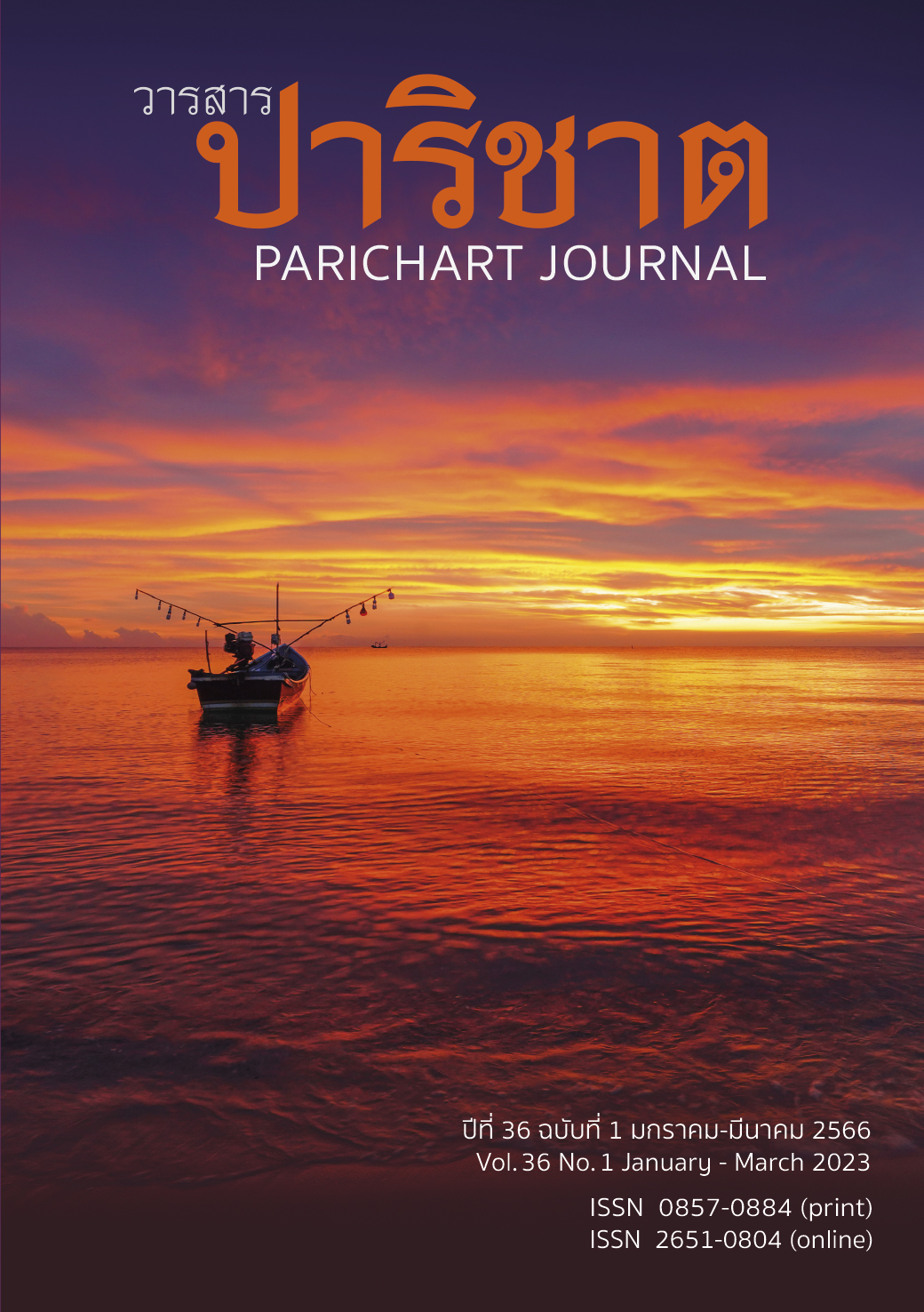Relationship of Factors Affecting Drug Abuse among Youth in Pattani Province
Main Article Content
Abstract
This quantitative research was to study the relationship among family factors, peer factors, community factors, teacher factors, media factors, intra-personal factors, and drug addiction among youth in Pattani Province by analyzing data using non-parametric statistics (Nonparametric Statistics). The target group were 19 youths addicted to drug cases in Pattani Province. The results showed that the youth in Pattani had drug addiction behavior at a moderate level, which was related to internal factors. At a high level, family factors, peer group factors and community factors were moderate, with teachers and media factors being low. However, the community factors were considered to be positively correlated with drug addiction behavior of the youth. Media factors were positively correlated with drug addiction behavior of the youth. Teacher factors were positively correlated with drug behavior of the youth at the statistical significance of .001 level, and self-interest factor was positively correlated with drug addiction behavior of youth with the statistical significance of .01 level. The variables studied could be used to expand the results of studies in other areas to confirm the findings for further submission as a policy.
Article Details

This work is licensed under a Creative Commons Attribution-NonCommercial-NoDerivatives 4.0 International License.
References
Lhaomeephol, P. (2015). Barriers to Implementation of Prevention and suppression Narcotics Police Station, Pathum Thani. Bangkok: Thammasat Univerity. (In Thai)
The narcotics Suppression Bureau. (2016). Results of the nationwide drug suppression of the year 2016. Bangkok: Bangkok blog. (In Thai)
Wanichsuwan, C. (2010). Factors Affecting the Juvenile Delinquency in the Observation and Protection Center of Songkhla Province. Songkhla: Prince of Songkhla University. (In Thai)
Thathanakul, S. (2010). Adolescence and Drugs. Phitsanulok: Naresuan University. (In Thai)
The strategic Plan for Drug Prevention and Solution. (2019). Office of the Narcotics Control Board. From https://www.oncb.go.th
Office of the Narcotics Control Board. (2010). Experience in the treatment and rehabilitation of drug addicts. Bangkok: Drug Academic Division Drug Prevention and Solution Development Bureau, Office of the Narcotics Control Board.
Tansiri, A. (2017). Participation in defense and Solution drugs problem Case Study of Klaeng District Rayong Province. Bangkok: Burapha University. (In Thai)
Muninaem, K. (2018). Drug Problem Solving by Community Leaders and People in Barahor Mueang Office of the Narcotics Control Board. (1990). Therapeutic work experience and Rehabilitation of drug addicts. Bangkok: The department of Narcotics, Prevention and Solution Development Bureau drug problem and Office of the Narcotics Control Board. (In Thai)
Wongsamut, N. (2017). Survey results of the Center for Drug Prevention and Solution Department of Treatment. Internal Security (Part 4). From http://www.bbc.com/Thai/40024683
Criminal Case System. (2019). Top 10 cumulative children and youth in observation institutions across the country. From http://www2.djop.go.th/warroom2/showcm.php?year=2019 District, Pattani Province. Pattani: Prince of Songkhla University. (In Thai)
Urairat, M., & Laeheem, K. (2018). The Relationship between Interpersonal Ralationship and Current Self-concept with Self-esteem of the Elderly at Jong-Hua Foundation, Songkhla Province. Parichart Journal: Thaksin University. (In Thai)
Lun-sai, S. (2001). Documents for the seminar on proactive strategies in the prevention and solution of drug problems in Academy. Bangkok: Kurusapa Ladphrao. (In Thai)
Bandura, A. (1986). Social foundation of thought and action: A social cognitive theory. Englewood Cliffs, New Jersey: Prentice-Hall.
Iam-Suphasit. (2007) Theories and techniques of behavior modification (8thedition). Bangkok: Chulalongkorn University.
Spielmann, S. (1993). Personality Development: Tendency towards Normal Behavior and Deviational Behavior among Children and Youth. Bangkok: Mahidol University. (In Thai)
Khantee, P., Pitanilabutr, T., & Wattanawiboon, A. (2000). Criminology: Theories and research. Bangkok: Booknet. (In Thai)
Chatu-hongand, S., & Tan-sri-sa-kul, S. (2018). Factors affecting Relapse Drug Users with Competency Rehabilitation in Treatment Compulsory System as a Case Study of Office of Probation, Roi-ed Province. Chophayom Journal: Mahasarakham University. (In Thai)
Termme, T. (2014). A Study of Drug addiction Motivation among Youth in Phitsanulok Province. (Master of Public Administration). Pibulsongkram Rajabhat University, Phitsanulok. (In Thai)
Wongsawan, P. (2009). The Behavior of Teenagers Amphetamine Usage: A Case Study. (Master’s Project, M.Ed.). Bangkok: Srinakarinwirot University. (In Thai)
Chairat, P. (2003). The research report for reaction on family and community interactions on drug addicts. Prince Of Songkla University, Pattani. (In Thai)


